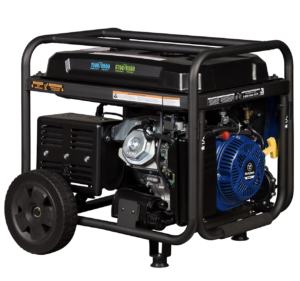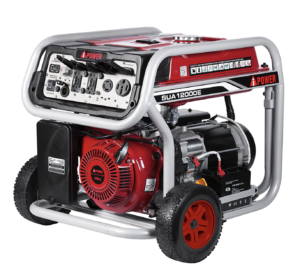What Is A Portable Generator?
We all know how awful it can be when our power goes out. Our society has made it to where almost everything we touch, turn on, or interact with uses energy to function. Power tools are no exception, and once the batteries have been used, they need a recharge, or you need a power source to run your corded power tools, lights, and equipment if you are a contractor working on a customers project, where electric isn’t turned on just yet. A portable generator, can be a life saver, its typically smaller in form compared to inverter or stand by generators, allowing you to power equipment, or your home temporarily, anywhere or anytime.
When Would You Need A Generator?
I want to also note, that people love waiting until the very last minute to buy a generator. Only then, when an emergency happens, retailers and individuals can take advantage of the situation, charging way more than what the portable generator is worth.
Emergency situations are the top reasons for why you should always keep at least a portable generator around. Depending on where you live, I’m sure there are various reasons as to what would justify an emergency. If there is an earth quake and utilities go down, ice or snow storms, hurricanes, tornados, severe thunderstorms and high wind speeds, etc.
For the sake of this article and research, I want to make sure the reader understands that I am only talking about portable generators here. Most people, can not afford stand by, inverter or more expensive pieces of equipment. However, when there is an emergency, you need to remember, that:
Your refrigerator uses 600watts of power, Portable heaters can use UP TO 1500 watts of power, and depending on the light, 60 to 500 watts of power for that. So you need to understand, that in emergency situations you will need your food to be good, and to stay warm if in the winter time. You need to prioritize if there is any special medical equipment that needs to on at all times and does not have a battery source for power.
Portable generators are the best value when it comes to cost/capacity, and certain types will produce more than enough to power you home, as long as you keep it simple. In certain situations, you need to keep extension cords stored specifically for the use of your generator. Most can power up to 8000 watts of electricity, and you can approach things a certain way.
- You can use the interface that is already mounted onto the portable generator, which will allow you to plug in a few 110 and 220 volt plugs, so you can temporarily run things until the situation does not require the generator anymore.
- Switch For Home Power meaning, you can have a switch installed, that will take the power that is generated from your portable, inverted, or home back up generator, and deliver it right into the same box the power from the utility line comes into. Most standard homes are going to be a 220 volt input of electricity, meaning you will need to source a portable generator that will produce about 5, 250 watts of power. I had a switch box installed for my solar panels, and a back up generator if I ever chose to run it, and I am in the midwest, the total was about $1100.00 including the labor and parts.
If you are prone to many black outs, or power outages, it makes more sense to use a portable generator, that is protected from rain and snow, and have it as a back up, so you have power. You should consider investing into a interlock device, that will protect your home and portable generator when power is restored. However, most companies are installing surge switches, that will disable and shut the generator off when another source of energy is out putting into the same switch.
Awesome Features On Portable Generators
- Electric Start – Most generators now, will be accompanied by a small battery, switch (push button or toggle), and a starter to crank the engine over to get the generator up and running. However, the standard pull string style case is still there as a back up, incase the battery does not get a charge it needs or dies. This insures you will still have power when you need it.
- Fuel Gauge – which can tell you the level of fuel in the portable generator, so you can properly refuel when its needed.
- Safety Precautions – in case of low oil in the engine, power surge, poor engine performance, there is a safety shut off switch built right into your portable generator.
- Alternative Fuel – this is the greatest feature I have found. 10 Years ago, most generators ran off gasoline. Period. However, now that technology has come such a long way, you are starting to see more and more fuel options in case you run out of gasoline. Right now, you can guy portable generators that can run off gasoline, diesel, or propane. All on one machine. This give you a survival advantage when you run out of gasoline, and need to heat your home, you can unhook the propane tank from your grill, and power your generator if you needed to. From the research that I have gathered, they are also working on natural gas functions as well, since it is close to propane in chemical make up.
- Efficiency – more powerful and brushless motors, modern technology can allow for more and more wattages of power to be produced on the same size engines that produced half the wattage a decade ago. Also keeping the reliability factor in play, so the generator last longer for the user.
Tips To Remember When Owning A Portable Generator
- Proper Storage – these motors that power our portable generators use gasoline most of the time, and they produce carbon monoxide, which is a very poisonous gas, that can not be seen. Make sure there is proper ventilation or keep a small enclosure for your generator, so you will not be injured during an already stressful and dangerous situation.
- Maintenance – always check the oil, keep it at a safe level, clean off dirt, dust, or debris that will eventually build up. If you are using a dual fuel type, or a straight gasoline portable generator, check the air filter, make sure it is kept clean of dirt, and blockages. Proper air flow, and fuel mixture, guarantees performance, efficiency and durability. Engines perform better when they can breathe fresh air.
- Don’t Under Power – you need to try and calculate how much wattage your home or devices use, and make sure you have the proper energy or wattage produced by your portable generator.
What Brands Of Portable Generators Should I Buy?
There are tons of different companies trying to produce the “best” of something right? However, from experience I will recommend a couple portable generators for you that can be found on Amazon.
Westinghouse Duel Fuel 7500 Watts 9500 Peak Watts Portable Generator
4 stroke 220cc gasoline engine that features an low oil shut off switch. It has an amazing engine out put. The gasoline engine can produce 7500 watts and peaks out at 9500, but when its on the propane type gas, the peak is 6750 watts and peaks out at 8550 watts. It also features a FOB remote that can be used, so you don’t have to keep going out side if you need to crank out more power! Westinghouse provides a 3 year standard warranty. You can purchase a Westinghouse dual fuel portable generator on Amazon.com.
A-iPower 12,000 Watt Gasoline Powered Electric Start Generator GFCI Outlets
This was an amazing generator, that actually is kept at my farm to power my stationary power tools, until I get my electrical ran, and switch installed, it will be a back up in case the power is to go out. It has a 7 gallon fuel tank, and if its at 50% load time, can run for almost 9 hours. 12,000 starting watts, and 9000 running watts, and the wheels on this design, have a nice tread design, for traction and grip in the dirt and mud, incase you are out in rough terrain, or at a new construction site. This generator has a 5 year warranty from the manufacturer. A-iPower sells their 12,000 watt portable generator on Amazon.com.
Conclusion
You should always take safety into consideration no matter what the situation is. These machines produce dangerous amounts of electricity, and need to be kept in a dry, well ventilated place. Use the proper equipment when you are putting power into extension cords, or switch boxes. Make sure all connections are dry, and properly tightened.
They do produce smaller more portable generators on the market. Until I was able to afford a bigger one, I mainly used my small 1200 watt generator to power my refrigerator and fan on my propane powered heater, during the ice storm of 2009, which left us without power for 11 days. Granted, we all I’m sure have learned many great tricks and tips in the event of an emergency, requiring all means necessary survival. Make sure you periodically rotate your gasoline reserves, and keep a decent amount stored, in case you ever need to use it. If you purchase a dual fuel style, I would advise you on stocking up on more propane tanks. Because you can rotate grilling food, when no electric can power your stove, and efficient long lasting fuel for heat and power.


